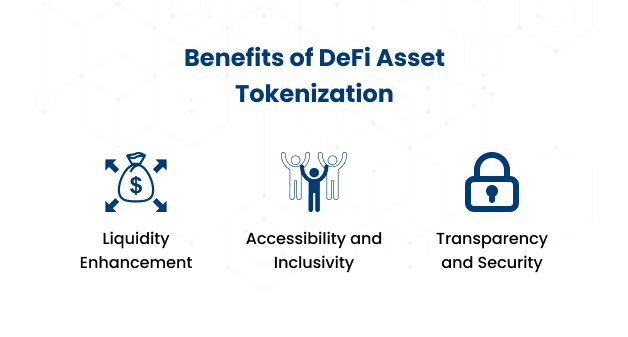-
In the ever-evolving landscape of decentralized finance (DeFi), asset tokenization has emerged as a transformative concept, powered by smart contract development. It is reshaping the way traditional financial assets are represented and traded. This innovation leverages the power of blockchain technology to convert tangible assets into digital tokens, unlocking new avenues for liquidity, accessibility, and transparency.
Understanding DeFi Asset Tokenization
DeFi asset tokenization refers to the process of converting real-world assets into digital tokens that are stored and managed on blockchain platforms. Real-world assets include traditional financial instruments (stocks, bonds, real estate), commodities, or other tangible assets. These tokens, often referred to as tokenized assets, represent ownership or rights to the underlying physical assets.
This tokenization process combines the features of blockchain's transparency and security with the efficiency of DeFi protocols. It creates a bridge between traditional assets and the decentralized world.
Check It Out | Asset Tokenization Development | A Comprehensive Guide
DeFi's Role in Asset Tokenization
DeFi platforms play a pivotal role in the tokenization of assets by providing the infrastructure and tools necessary for creating, managing, and trading tokenized assets. These platforms offer decentralized exchanges, liquidity pools, and smart contracts. They automate various aspects of asset management, such as the distribution of dividends and interest payments.
This decentralization fosters efficiency, removes intermediaries, and empowers participants.
Benefits of DeFi Asset Tokenization
From enhancing liquidity to boosting security and transparency, here are the benefits of DeFi asset tokenization:

Liquidity Enhancement
Traditionally, improving liquidity is a challenging task for many assets like real estate, art, or private equity. DeFi asset tokenization can bring a significant boost to liquidity.
Fractional ownership becomes feasible by converting these assets into digital tokens. It enables investors to buy and sell smaller portions of high-value assets.
Users can trade these tokenized assets on decentralized exchanges (DEX) 24/7. It eliminates the need for intermediaries and offers rapid settlement. This newfound liquidity improves market efficiency and also opens doors to a more diverse investor base.
Accessibility and Inclusivity
Asset tokenization removes barriers that restrict asset access to only a privileged few. Individuals with lower capital can invest in otherwise inaccessible assets through fractional ownership. This democratization aligns with the principles of decentralized finance, enabling broader participation in investment opportunities.
Additionally, DeFi asset tokenization diminished geographical barriers as tokenized assets are globally accessible, making real estate, art, and other valuable assets available to a more diverse range of investors.
Transparency and Security
The inherent transparency of blockchain technology guarantees that every transaction and transfer of ownership for tokenized assets is permanently documented. This unalterable ledger reinforces transparency across the entire lifecycle of the asset, starting from its creation and extending through its trading.
Moreover, smart contracts automate vital processes like distributing dividends and interest payments. They mitigate the potential for human mistakes and fraudulent activities. This automated system increases security and also fosters confidence among participants.
You May Also Like | Driving the DeFi Revolution with Smart Contracts
Use Cases and Examples
DeFi asset tokenization on the blockchain brings actual benefits by enabling customized solutions across industries. As blockchain gains momentum, this process becomes crucial for creating smart solutions. Let's explore its diverse applications in different sectors, showcasing its relevance and potency:
Real Estate
DeFi asset tokenization can introduce new levels of accessibility, liquidity, and efficiency in the real estate sector. Through tokenization, real estate properties can be divided into digital tokens.
DeFi asset tokenization enables fractional ownership and makes high-value properties accessible to a broader range of investors. It enhances market liquidity as well as eliminates traditional barriers to entry.
Intellectual Property
Creators can efficiently manage ownership rights and monetization by tokenizing intellectual property assets such as patents, copyrights, and trademarks. Tokenization enables fractional ownership and allows creators to sell fractions of their intellectual property to a wider pool of investors. It democratizes access to potential revenue streams.
Smart contracts automate royalty distribution and ensure creators receive their fair share while enabling investors to participate in the success of innovative creations. This seamless integration of DeFi principles with intellectual property empowers creators, investors, and innovators within a transparent and inclusive ecosystem.
Artwork
DeFi asset tokenization is a game-changer in the art world. It offers a transformative use case for both creators and investors. Artists can expand their reach and monetization avenues by tokenizing artworks. Investors, on the other hand, can own fractions of high-value artworks, making art investments accessible to a broader audience.
Tokenization enhances liquidity and allows investors to trade art tokens on decentralized platforms. Smart contracts automate royalty payments to artists whenever their tokenized artworks are resold. They ensure fair compensation for their creations.
This fusion of DeFi and art democratizes art ownership, enriching the creative ecosystem and fostering new interactions between artists and enthusiasts.
Explore More | Real Estate Tokenization and Blockchain | An In-depth Guide
Conclusion
DeFi asset tokenization is a revolutionary convergence of traditional finance and cutting-edge technology. It offers enhanced liquidity, accessibility, and security for a diverse range of assets by leveraging blockchain's attributes and DeFi's efficiency. As the DeFi ecosystem continues to evolve and innovate, the transformative potential of asset tokenization will reshape the financial landscape.
Interested in leveraging the full potential of DeFi asset tokenization? Connect with our blockchain developers to get started.

Our Offices
INDIA
Emaar Digital Greens, Sector 61,
Gurugram, Haryana
122011.
Welldone Tech Park,
Sector 48, Sohna road,
Gurugram, Haryana
122018.













